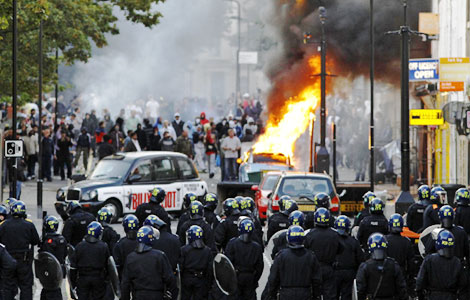Determining true significance of US credit downgrade
Updated: 2011-08-15 15:28
By Wu Zhenglong (peopledaily.com.cn)
|
|||||||||||
Standard & Poor's recently downgraded the long-term U.S. credit rating from AAA to AA+ with a negative outlook. In fact, the agency downgraded not only the rating of U.S. debt but also the rating of the country's political and economic governance capacity.
From a political perspective, the rating agency's move has shown its lack of confidence in the U.S. government's ability to solve debt problems. The agency wrote in its downgrade press release, "The political brinksmanship of recent months highlights what we see as America's governance and policymaking becoming less stable, less effective and less predictable than what we previously believed."
The U.S. debt ceiling has been raised more than 70 times over the past 50 years, but such a protracted dispute between Democrats and Republicans this time was unprecedented. Both parties used the debt limit as a political bargaining chip to gain an advantage in next year's presidential elections. The "brinkmanship strategy" adopted by the two parties has completely exposed their lack of willingness and ability to solve the country's deep-seated debt problems.
From an economic perspective, the downgrade decision has shown Standard & Poor's discontent over the last-minute debt-limit compromise deal reached by the two parties. The agency believes that the deal cannot really help stabilize financial markets nor can it help the country get rid of its debt addiction.
Will the United States learn a lesson from the downgrade and start living within its means? There are three reasons why it is unlikely to do so.
The United States has become addicted to borrowing money. The U.S. dollar is the major currency for global foreign reserves. Therefore, once the United States meets an economic problem, it will abuse this privilege and start its "money printing machine" to shift its own problem to the world. It is almost impossible to stop this abuse of privilege only by the self-discipline of the United States.
The expensive high-standard U.S. welfare system relies on debts. The Untied States has been implementing its various high-standard welfares by increasing deficits for a long time and has been used to spending more money than its incomes, and therefore, the scale of its debts has become extremely large.
If it wants to reduce its deficits, a reform that involves such welfares as medical insurances and retirement pensions of low and medium-income stratums must be carried out, and it will affect the votes for the Democratic Party. Otherwise, if it increases taxes, the interests of the business circle will be harmed and the votes for the Republican Party will be affected. Since 2012 will be the year of U.S. general election, both of the parties will not compromise easily.
The United States' actions for safeguarding its supremacy have made its deficit burden even heavier and keep breaking the upper limit of its debts.
This time, Standard and Poor's gave a non-confidence vote for the political and economic administrations of the United States. Although it was only an individual opinion, it will make the gloomy U.S. economy even worse and cast a shadow over the future trend of global economic development.




